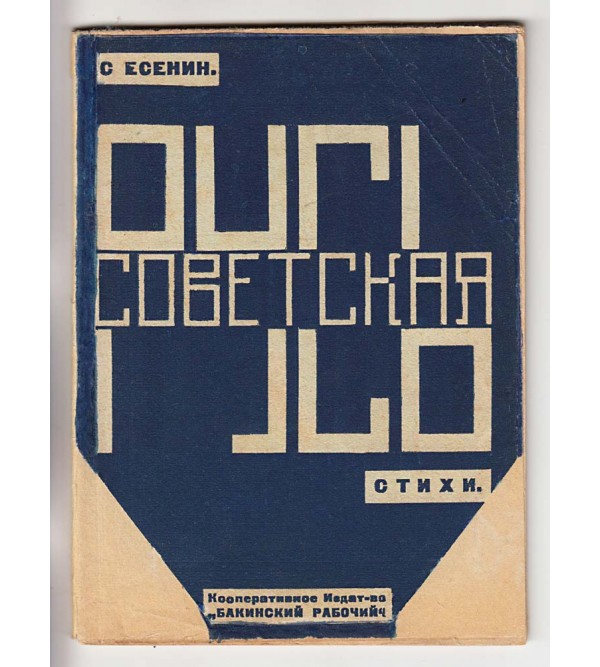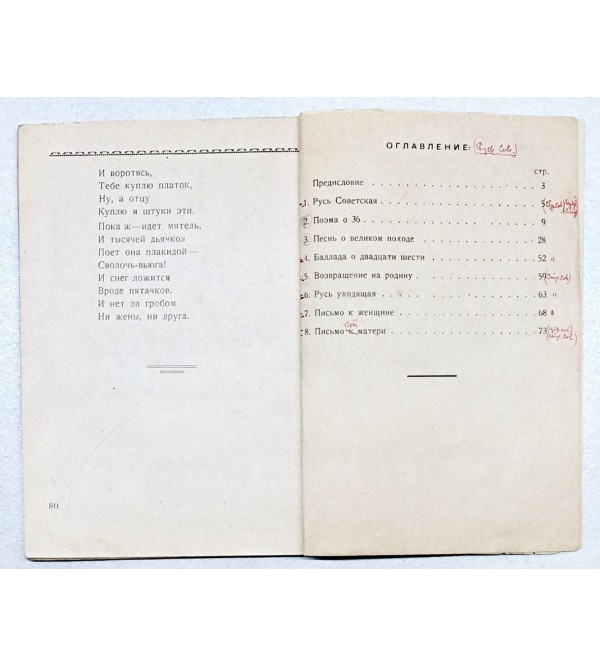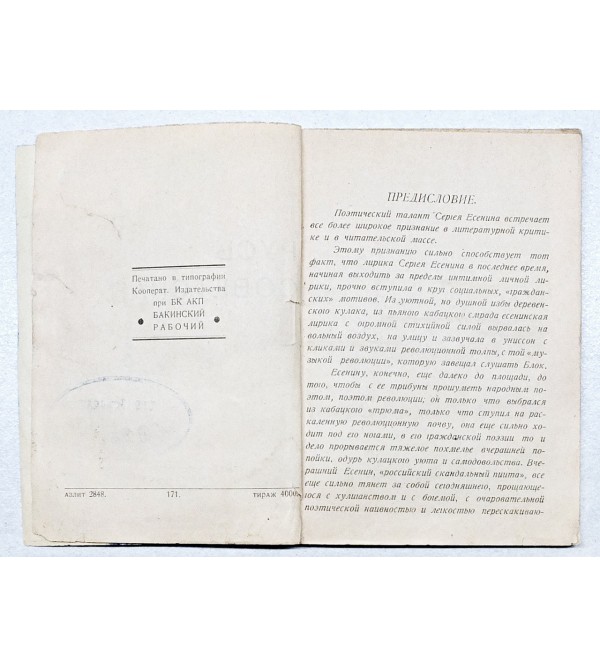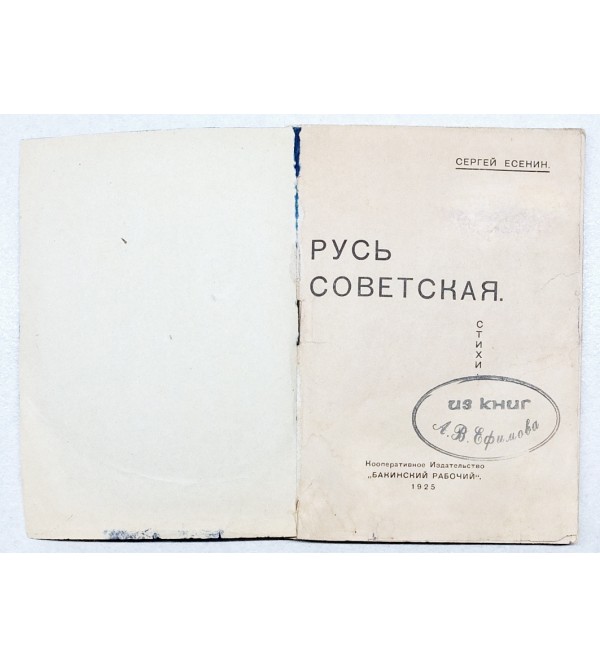Rus' sovetskaya : stikhi (Soviet Russia : poems)
- 2,200€
- Product Code:10
- Availability:In Stock
The book is in good condition; cover shows some rubbing, tear to the upper edge of the front cover along the spine fold, creases across outer corners of the front cover, repaired upper- and fore-edge of the back cover; internally ..
Tags: rare books, first edition books, Russian avant-garde, constructivism, cubism, futurism, Sergei Esenin
The book is in good condition; cover shows some rubbing, tear to the upper edge of the front cover along the spine fold, creases across outer corners of the front cover, repaired upper- and fore-edge of the back cover; internally some soiling and personalised stamp on the title page, red pen marks on the contents page.
This rare provincial edition was realised in Baku by cooperative publishing house "Bakinskij rabochij" (Baku worker), where worked one of the Esenin’s closest friends, well-known political and literay figure of the time, secretary of the Azerbaijan Communist Party, Sergei Kirov's deputy - Petr Ivanovich Chagin. The book was published with his assistance, he was also an author of the foreword.
The collection, which became programmatic for Esenin, includes 8 poems written in the 1924-25. But actually, it is a kind of trilogy based on three main poems "Vozvrashchenie na rodinu" (Return to Motherland), "Rus' Sovetskaja" (Soviet Russia), "Rus' ukhodjashchaja" (Departing Russia), which were created inspired by his visit to native village. The main idea of the trilogy is longing and pain for the old good time. The Poet returns to his native village and cannot recognize it anymore after the Bolsheviks came to power. He observes how the people around have changed, how the new generation loudly and imperiously declares their rights, how new values have appeared, how beloved village is passing away, with such warmth being sung by him in youthful poems. Esenin originally supported the October Revolution but was later disillusioned by the Bolshevik regime. Thus, he lamented the destruction of the traditional peasant way of life and felt an overpowering sense of his own uselessness. Esenin looks back on his life path, reflects on the meaning of life, tries to comprehend the events that changed the history of his homeland, to find his place in the New Russia. Thoughts of death often appear in the poems.
The collection also includes “Pis’mo k materi” (Letter to Mother), which is one of the best Esenin’s lyric poems. It was written before poet's arrival in his native village and isaddressed to his mother. In September 1924, Eesenin visited the Transcaucasian republics, where he wrote among others “Ballada o dvadtsati shesti” (The Ballad of Twenty-six) about Baku Commissars, the poem “Pismo k zhenshchine” (A Letter to a Woman) dedicated to his wife, an actress Zinaida Reich, both published in the current collection. In 1925 was written “Poema o 36” (The Poem about 36), which poet dedicated to the fighters against the autocracy, revolutionary prisoners of the Shlisselburg fortress, political exiles and "Pesn o velikom pohode" (Song of the great campaign) on a historical-revolutionary theme, based on the events of defense of Petrograd in 1918, which also appeared in this book.
Sergei Esenin (1895-1925) is recognized as the first among writers and poets of the XX century. He is named "Pushkin of the XX century". Esenin’s early contemplative lyrical verse (1914–1916) idealised Russian nature and the village. Esenin was a founding member of the Imaginist group (1919–1924), but his alliance with the imagists, who placed the artistic image at the top of poetry, did not last long. Esenin’s poetry of the 1920s became markedly pessimistic. Poet was disenchanted in Bolshevik revolution when he saw that it would not prove beneficial to the peasant class, but lead only to the industrialization of Russia. Dissapionted with changes in his motherland, Esenin began to led an erratic, unconventional life that was punctuated by bouts of drunkenness and insanity. Following the poet’s suicide in December 1925, Esenin’s poems that expressed decadent attitudes toward life and his sensational self-destructive behaviors were criticized by Bolshevik leaders and critics as “eseninshchina” (Eseninism). Esenin’s works were not republished in the Soviet Union until the 1960s.
Book is also notable for its striking constructivist cover designed by unatribited artist.
| Specification | |
| Author | Sergei Esenin |
| Publisher | Kooperativnoe izdatel'stvo "Bakinskij rabochij", [Baku] |
| Published year | 1925 |
| Country | Russia |
| Edition | 1st edition |
| Binding | Soft cover |
| Octavo | 12 x 16 cm. |
| Weight | 0.060 kg. |
| No. of pages | Wrappers, 81 pp. |
| Print run | 3000 copies |
| Language | Russian |



